
Pediatrics is the branch of medicine that involves the medical care of infants, children, adolescents, and young adults. In the United Kingdom, paediatrics covers many of their youth until the age of 18. The American Academy of Pediatrics recommends people seek pediatric care through the age of 21, but some pediatric subspecialists continue to care for adults up to 25. Worldwide age limits of pediatrics have been trending upward year after year. A medical doctor who specializes in this area is known as a pediatrician, or paediatrician. The word pediatrics and its cognates mean "healer of children", derived from the two Greek words: παῖς and ἰατρός. Pediatricians work in clinics, research centers, universities, general hospitals and children's hospitals, including those who practice pediatric subspecialties.

Preterm birth, also known as premature birth, is the birth of a baby at fewer than 37 weeks gestational age, as opposed to full-term delivery at approximately 40 weeks. Extreme preterm is less than 28 weeks, very early preterm birth is between 28 and 32 weeks, early preterm birth occurs between 32 and 34 weeks, late preterm birth is between 34 and 36 weeks' gestation. These babies are also known as premature babies or colloquially preemies or premmies. Symptoms of preterm labor include uterine contractions which occur more often than every ten minutes and/or the leaking of fluid from the vagina before 37 weeks. Premature infants are at greater risk for cerebral palsy, delays in development, hearing problems and problems with their vision. The earlier a baby is born, the greater these risks will be.
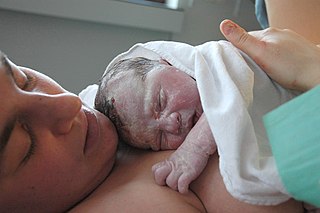
Kangaroo mother care (KMC), which involves skin-to-skin contact (SSC), is an intervention to care for premature or low birth weight (LBW) infants. The technique and intervention is the recommended evidence-based care for LBW infants by the World Health Organization (WHO) since 2003.
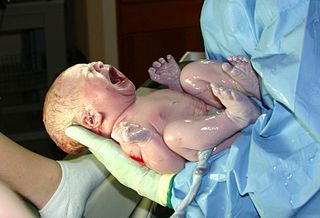
Neonatology is a subspecialty of pediatrics that consists of the medical care of newborn infants, especially the ill or premature newborn. It is a hospital-based specialty and is usually practised in neonatal intensive care units (NICUs). The principal patients of neonatologists are newborn infants who are ill or require special medical care due to prematurity, low birth weight, intrauterine growth restriction, congenital malformations, sepsis, pulmonary hypoplasia, or birth asphyxia.

A neonatal intensive care unit (NICU), also known as an intensive care nursery (ICN), is an intensive care unit (ICU) specializing in the care of ill or premature newborn infants. The NICU is divided into several areas, including a critical care area for babies who require close monitoring and intervention, an intermediate care area for infants who are stable but still require specialized care, and a step down unit where babies who are ready to leave the hospital can receive additional care before being discharged.
Fetal viability is the ability of a human fetus to survive outside the uterus. Medical viability is generally considered to be between 23 and 24 weeks gestational age. Viability depends upon factors such as birth weight, gestational age, and the availability of advanced medical care. In low-income countries, half of newborns born at or below 32 weeks gestational age died due to a lack of medical access; in high-income countries, the vast majority of newborns born above 24 weeks gestational age survive.
Necrotizing enterocolitis (NEC) is a devastating intestinal disease that affects premature or very low birth weight infants. Symptoms may include poor feeding, bloating, decreased activity, blood in the stool, vomiting of bile, bowel death, multiorgan failure, and even death.

Neonatal jaundice is a yellowish discoloration of the white part of the eyes and skin in a newborn baby due to high bilirubin levels. Other symptoms may include excess sleepiness or poor feeding. Complications may include seizures, cerebral palsy, or kernicterus.
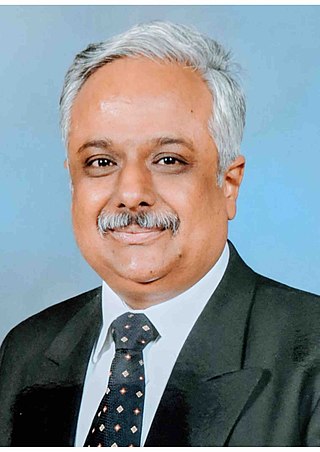
Dr. Karthik Nagesh is a neonatologist in India. He has been practicing neonatal intensive care since 1992 at the Manipal Hospital in Bangalore. He is well known in India for his pioneering work in intensive care for sick neonates especially, Surfactant Therapy and ventilation for sick babies with respiratory distress. He is currently the Chairman of the Manipal Advanced Children's Center and Chairman and HOD of Neonatology and Neonatal ICUs at the Manipal Hospitals Group as well as an adjunct professor of paediatrics, KMC at Manipal University.
The Bloxsom air lock was an incubator used in the treatment of respiratory distress among newly born infants in the 1950s. The device attempted to mimic the rhythm of uterine contractions, which were thought to have a role in stimulating fetal breathing. The device was developed by Dr. Allan Bloxsom, a pediatrician at St. Joseph Hospital and Baylor College of Medicine in Houston, Texas. At its peak, the device was utilized in more than 700 hospitals.
Julius Hess was an American physician who is often considered the father of American neonatology. In 1922, he published the first textbook focused on the care of prematurity and birth defects in infants. That same year, Hess and nurse Evelyn Lundeen created the first premature infant station in the United States, recognizing the importance of nursing care and temperature management in the care of preterm babies. Hess also made early contributions to the transport of such infants to specialty centers.
Evelyn Lundeen was an American nurse who headed the first premature nursery in the United States with Dr. Julius Hess. Outside of her work at the nursery, Lundeen traveled to other cities to teach the principles of nursing care for premature infants. With Hess, she also co-authored an early textbook on premature baby care.
Late preterm infants are infants born at a gestational age between 34+0⁄7 weeks and 36+6⁄7 weeks. They have higher morbidity and mortality rates than term infants due to their relative physiologic and metabolic immaturity, even though they are often the size and weight of some term infants. "Late preterm" has replaced "near term" to describe this group of infants, since near term incorrectly implies that these infants are "almost term" and only require routine neonatal care.
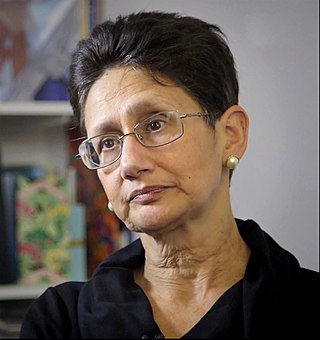
Neena Modi is a British physician and Professor of Neonatal medicine at Imperial College London. She is the current president of the UK Medical Women’s Federation, and past president of the Royal College of Paediatrics and Child Health, serving in this role from April 2015 to April 2018. She is one of only four women to ever hold this position.

Herbert Barrie, was a British consultant paediatrician and a leading figure in neonatology. He was a pioneer in the emerging specialty of paediatrics and neonatal medicine; and he developed one of the first neonatal intensive care units in London.
Andrew Wilkinson is a Professor Emeritus of Paediatrics and Perinatal Medicine at All Souls College, Oxford. Wilkinson is most notable for being an international authority in neonatology and a lead author of the Standards of Care for NICU and NICE guidelines on retinopathy of prematurity.
Neil McIntosh is a British and Scottish paediatrician and neonatologist who was most notable for being the leading writer of a pivotal article that defined standards of ethical behaviour in paediatrics, including withdrawal of newborn intensive care. McIntosh is emeritus professor of Neonatology and Child Life and Health at the University of Edinburgh. During McIntosh's career he has researched mineral metabolism in preterm infants, computerised acquisition of physiological data in Neonatal Intensive Care Nursing.
Jen-Tien Wung is a Taiwanese-American pediatrician, author and professor of pediatrics at Columbia University's New York Presbyterian Hospital who developed Bubble CPAP for the treatment of premature babies.
Christian P. Speer is a German pediatrician and Professor of Pediatrics specialized in neonatology at the Julius Maximilian University of Würzburg. Speer is known for his scientific and educational contributions in neonatal medicine.
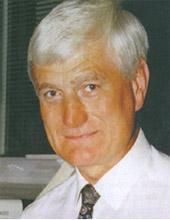
Henry Lewis Halliday was a British-Irish peaditrician and neonatologist. In 2021, Halliday was awarded the James Spence Medal for research into neonatology, for coordinating two of the largest neonatal multicentre trials for prevention and treatment of a number of neonatal respiratory illnesses and for a breakthrough in the development of a new lung surfactant that brought relief to very small babies suffering from infant respiratory distress syndrome (RDS).










